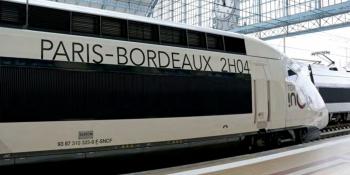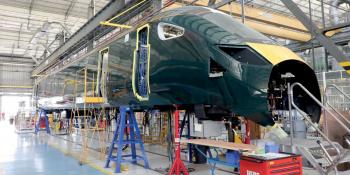EUROPE
COVID-19 IMPACTS RAIL SERVICES
The ‘Coronavirus’, now named Covid-19, broke out in Wuhan in central China in late December 2019 and appeared to be initially contained within China, not least due to extraordinary restrictions on movement for millions of people and extension of nationwide lunar new year holidays in January. By February 2020 the virus had been spread by people travelling to multiple countries, including the UK, although the impact was most severe in Italy, South Korea and Iran at the time of writing in early March.
By mid-March the virus was causing governments around the world to make plans for public health related restrictions on travel and activity. Initially the impact on Europe’s rail system was chiefly the reduction in the number of freight trains from China, which in late 2019 were being despatched three or four times a day westward. Whilst the lunar new year holidays would have reduced the number anyway in January, the prolonged closure into February of many factories in China and inability to dispatch trains as parts of the Chinese rail system effectively shut down led to a steep decline in the number of trains operated, with most routes closed during January until late February – although some remained closed into March as parts of China remained quarantined.
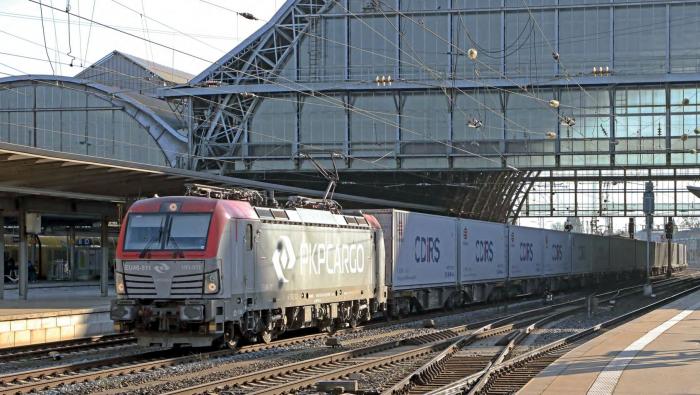
The resumption of transport links from China to Europe has posed problems for rail freight operators, not least a shortage of containers with large numbers still in China or effectively trapped in Chinese ports by the effects of the long shut down period after the lunar new year. These problems have also affected shipping lines as new cargo could not in some cases be loaded before the backlog of previously unloaded containers was moved. Air freight prices from China in March were substantially higher than previously as European-based manufacturers sought to keep open production lines reliant on Chinese-made components. It is likely in the medium term that rail freight volumes between China and Europe will increase as manufacturers seek to rebuild their stocks of Chinese-sourced components.
ITALY IN LOCKDOWN
The Covid-19 outbreak in Italy began in early February and was initially confined to a number of small towns in the north of the country, between which it had been spread before being first detected. Local restrictions on activities were followed by a nationwide lockdown on 9 March, with travel opportunities severely limited.
Neighbouring countries put in place new arrangements for travel to and from Italy. All passenger services from Austria to Italy were suspended on 11 March until (at least) 3 April and whilst freight trains were still running these were changing locomotives at the border to minimise any risk of the infection being spread inadvertently. The Swiss Government closed most border crossings with Italy from 11 March, although by the following day multiple EU countries were closing borders or severely restricting transport links; in most cases freight services continued to operate.
Many operators and infrastructure managers instituted procedures to minimise disruption in the event that large numbers of employees become unwell. In the Netherlands national infrastructure manager ProRail set up two parallel operations centres in different locations to minimise disruption if one had to shut temporarily. In Austria national operator ÖBB required all non-frontline employees to work from home and instituted a one metre minimum distance between members of staff working on trains and stations.
Urban transport operators across Europe introduced more frequent cleaning of commonly touched surfaces. These measures, including spraying of anti-viral compounds, were first seen in China and South Korea and by mid-March similar processes were underway on metro systems in most major cities worldwide.
AKIEM ACQUIRES MACQUARIE FLEET
Rolling stock leasing company Akiem agreed to acquire Macquarie European Rail’s rolling stock leasing business in mid-February, subject to competition law approvals. The Macquarie fleet being bought includes 137 diesel and electric locomotives used by 21 freight and passenger operators, including Class 66 and UK Class 70 diesel locos plus Bombardier Traxx / Alstom Prima electric locos. In addition, Macquarie owns 30 Class 379 EMUs currently leased to Greater Anglia in the UK and 16 Stadler GTW DMUs in use in the Netherlands.
Akiem, originally owned by French Railways (SNCF), has since 2016 been 50%-owned by SNCF subsidiary Transport Logistique Partenaire and 50% by Eurotraction, a subsidiary of the Deutsche Bank-owned Deutsche Asset & Wealth Management (DWS) private equity fund. In 2017 Akiem bought mgw Service, a pan-European rolling stock maintenance company based in Germany.
Since the DWS investment in the business Akiem has expanded its fleet by around 200 locomotives; many of them Bombardier Traxx electric locos. With the addition of the Macquarie fleet Akiem will now have over 600 locomotives in use with 65 different operators. In August 2019 Akiem agreed a €1.2 billion financing package with a consortium of European banks, refinancing its existing debt and providing a €400 million fund to invest in future acquisitions or asset purchases; the Macquarie acquisition was funded from this new borrowing.
ALSTOM ACQUISITION OF BOMBARDIER TARGETED FOR MID-2021
As we reported last month, on 17 February 2020 Alstom signed an agreement to buy Bombardier Transportation with Bombardier’s parent company in Canada and its biggest investor, Québec provincial government-owned Caisse de dépôt et placement du Québec (CDPQ).
This announcement followed a month of market speculation about a potential sale and was just hours after the Bombardier group announced poor financial results for 2019 (Earnings Before Interest and Taxes, at under €20 million, was down by around 97% compared to 2018) and the sale of the remaining stake in its mid-sized airliner aerospace business to Airbus. The failure of Bombardier Transportation to meet pre-agreed targets resulted in CDPQ increasing its stake at Bombardier’s expense to 32.5% of the company.
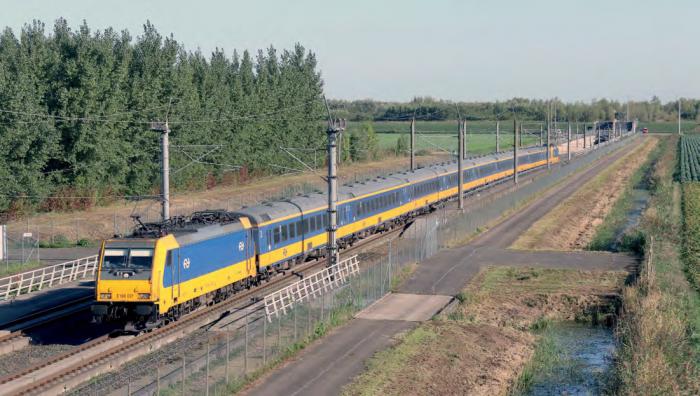
The planned transaction values Bombardier Transportation at between €5.8 billion and €6.2 billion. As a result of share changes following the deal, CDPQ will become Alstom’s biggest shareholder, with around 18% of the company. Bombardier Transportation parent company Bombardier Inc will buy €500 million of Alstom shares to help fund the transaction, giving it a stake in the financial turnaround of the business.
Alstom plans to issue new shares in 2021 to cover around €2 billion of the acquisition costs – which until then will be covered by borrowing, although any cash available in Bombardier Transportation itself at completion will also be used.
The expanded Alstom group will have an order backlog of €79 billion and combined annual sales of €15.5 billion. Alstom expects the deal to be finalised by June 2021 at the latest, subject to regulatory clearance by competition authorities in Europe and multiple other countries. It appears probable that the European Commission will require some sales of either production facilities or possibly product lines as a condition for approval of the deal.
The takeover of Bombardier by Alstom will probably lead to a rationalisation of manufacturing sites, especially in Germany where Bombardier has multiple sites and Alstom two main ones at Salzgitter and Stendal. Similar rationalisation is possible in France, where both companies have multiple sites and their main assembly plants are located within a few miles of each other near Valenciennes.
Matt Byrne, Bombardier Transportation’s President, UK Region, told Modern Railways he is more confident that the tie-up with Alstom will be approved compared to the previously mooted deal between Alstom and Siemens, which didn’t receive backing from competition authorities. ‘The Alstom and Bombardier businesses are much more complementary and I believe it would be highly positive for the UK’ Mr Byrne said, although he accepted there are areas of the business where there is more overlap that will be scrutinised closely.
AUSTRIA
ACHENSEEBAHN TO CLOSE?
In 2018 the 6.7km steam-operated Achenseebahn metre-gauge rack-equipped line from Jenbach to the Achensee lake, over 400 metres above the town, announced plans to operate all year round using second-hand EMUs converted to diesel-electric multiple-units. In early March 2020 the railway, owned since 1991 primarily by the local governments in the area it serves, announced it was likely to become insolvent within days following the refusal of further funding by the Tyrol regional government – bringing into question whether services will resume after the winter break as scheduled on 25 April.
The line’s operator had been in discussion with the Tyrol regional government to secure funding to enable operation this year and to fund the conversion of the five rack-fitted EMUs bought second-hand from the Appenzeller Bahn in Switzerland to DEMUs; in total €1.2 million had been provided in 2019-20. The discussions ended with regional politicians telling the local media they would be ‘negligent’ to allow any further funding to the Achenseebahn as it had failed to produce realistic long-term operating plans. The line currently operates only in summer as both snow and operating costs prevent any prospect of winter operation, but by introducing year-round services the railway had hoped to attract regional funding for providing public transport services – which it had not received until 2019.
CZECH REPUBLIC
ČD AND ÖBB ‘COLLUSION’ UNDER INVESTIGATION
Czech investigative news service Seznam Zprávy reported early in March that Czech national operator ČD is facing potential fines of up to CZK4 billion (€158 million) from the European Commission for allegedly colluding with Austrian national operator ÖBB to prevent Czech open access operator Regiojet from buying second-hand coaches to expand its services.
The apparently incriminating emails from February 2015 published by Seznam Zprávy were in English, as that was the common language for the Czech and Austrian managers involved – and reveal an explicit request by ČD to ÖBB to not sell rolling stock to Regiojet, despite the Regiojet offer being 33% higher than that of the Slovakian overnight train operator WGS. In the reply ÖBB agreed to ensure Regiojet does not buy the coaches.
The emails were among thousands seized in 2016 dawn raids by investigators looking into different accusations of predatory pricing by ČD against Regiojet and fellow open access competitor Leo Express. The emails were then the subject of a long-running legal battle, with ČD arguing the EU Commission had no powers to undertake the dawn raids; this was dismissed by the European Court of Justice in January this year.
It appears ÖBB is co-operating with the EU investigation and according to local media reports ČD is now considering doing the same. Perhaps complicating the issue, the Czech manager responsible for writing the February 2015 emails is Radek Dvořák, who is currently deputy chairman of ČD.
Regiojet had until 2015 bought around 80 second-hand coaches from ÖBB; after 2015 the company was unable to buy any more, according to comments from the company’s owner to the Czech media. The vehicles bought from ÖBB came with a contractual clause prohibiting their use in Austria – Regiojet has ignored this, as the restriction is unlawful, and has used the stock for services to Vienna daily since 2017. Since 2015 Regiojet has obtained second-hand long-distance coaches from both SBB of Switzerland and DB of Germany.
IRELAND
RECORD PASSENGER NUMBERS
Iarnrod Éireann (IÉ) recorded record numbers of passengers during 2019 with 50.1 million journeys being made across its three business sectors (InterCity, DART and Commuter), a growth of 4.4% on the preceding year. Several routes saw the highest passenger numbers ever.
The flagship Dublin to Cork route saw a 6% increase to a record 3.66 million passenger journeys recorded. The Dublin – Cork main line benefited from the opening of the new down platform at Limerick Junction which improved operating efficiency, removing the need for down trains calling at Limerick Junction to cross over to the up line platform. Further track improvements will take place on the route during 2020. Cork’s suburban services also broke records with the Midleton line showing a 10% increase of 480,000 journeys on the 10th anniversary of the reopening. Traffic on the Cork – Cobh line increased by 7% to 971,000, with the route benefiting from additional services catering for cruise traffic. 1.1 million passengers used through and connecting trains between Limerick (Colbert) and Dublin; this was the highest number ever recorded and a 6.7% increase on 2018.
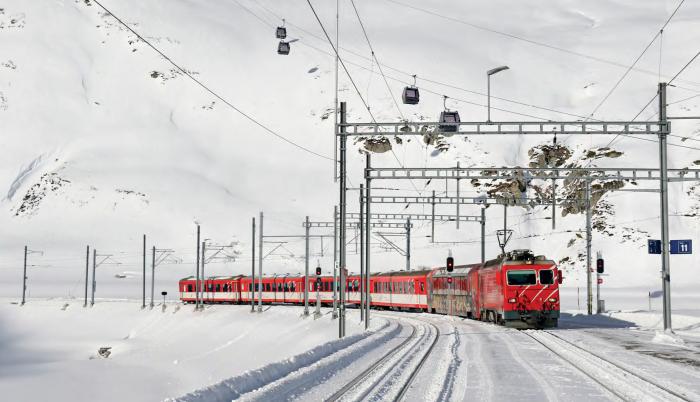
Both the Dublin and Limerick ‘Western Rail Corridor’ (‘WRC’) routes from Galway carried record passenger numbers in 2018 with numbers on the Dublin line increasing 4.1% to 2.13 million passengers. The Limerick route marked the 10th anniversary of its reopening by exceeding the half-million passenger mark for the first time with 531,000 trips being made (up 16% on 2018). Oranmore station, reopened as a part of the WRC project, saw a 40% rise in usage over the year. With the report on the proposed reopening of the next stage of the WRC to Tuam and Claremorris still unfinished, the large increase in use on the route surely cannot go unnoticed – although the economic turmoil unleashed by Covid-19 may affect this.
Waterford’s two lines also saw increased use, with 1.49 million passenger journeys on the Dublin route in 2019 (up 7.2%). Increased tourism to the Waterford region contributed to this increase in passenger numbers. Even the ‘Cinderella’ route from Waterford to Limerick Junction recorded a 3.7% increase with 43,000 passengers carried. A new Waterford station is to be built as a part of the ‘North Quays’ development, this replacing the present Waterford Plunkett station. It will have two 200m-long platforms and will form part of the new transport interchange.
The Dublin Connolly-based group of InterCity services also performed well, with the Rosslare line (including Wicklow commuter services) carrying 723,000 passengers (up 1.7%). This year IÉ is looking at options for further capacity and service enhancements on the route as part of the DART Expansion programme. The Sligo route continued to grow with passenger numbers up 3.3% (1.45 million passenger journeys), in part due to the additional train pair added last year. The ‘Northern Line’ to Drogheda had a 4.4% increase in passengers with 5.75 million journeys made. The extension of the DART to Drogheda will be carried out as part of the National Development Plan.
The Kildare route, including the service via Phoenix tunnel to Dublin Connolly, experienced strong growth with 3.1 million journeys in 2019 (up 6.5%), whilst the Maynooth line saw a 4.9% increase to 4.6 million passenger journeys. The interchange at Hazelhatch, where trains to the financial district via the Phoenix Park Tunnel can be accessed, has proved very popular. This year design work for the extension of the DART to Maynooth and Hazelhatch (including electrification works) will begin and a Railway Order will be drawn up.
The increase in passenger numbers on all routes has seen overcrowding on many services and this will not be alleviated until the 41 additional Class 22000 InterCity DMU carriages ordered in 2019 are delivered from 2023. An order for additional DART trains is due to be placed in Q3 2020. Modern Railways understands the initial tender resulted in significant interest from manufacturers in Europe and Asia. Tim Casterton
FRANCE
TGV DERAILS ON HIGH-SPEED LINE
A TGV Euroduplex set forming the 06.38 Colmar to Paris Est (via Strasbourg) TGV service derailed when it hit a landslide on the LGV Est Européenne high-speed line near Ingenheim in the Bas-Rhin département around 25km northwest of Strasbourg on 5 March. The train was carrying 348 passengers and derailed at around 270km/h, according to local media reports.
The train remained upright and only the first four vehicles derailed, although the leading power car ended up fouling the opposite line. The driver suffered several broken bones and was airlifted to hospital whilst 20 other people on board were injured and taken to local hospitals. The landslide, in a cutting, was significant, although most of it did not cover the track. The section of the LGV on which the accident occurred only opened in 2016.
SLOVAKIA
VTG BUYS CARBO RAIL
Wagon leasing firm VTG has expanded its ‘Retrack’ freight train operating company by acquiring a majority stake in Slovakian open access freight operator Carbo Rail. This company, based in Bratislava, was founded in 2017 through the merger of Czech-based Cargosped with Slovakian firm Rail Sped. The company, which employs around 150 people, operates in Slovakia and Hungary in conjunction with Czech national freight operator ČD Cargo, using a fleet of around 25 mostly second-hand ČD Cargo diesel and electric locos.
VTG’s core business remains wagon leasing across Europe and also in Russia, plus China. Its VTG Rail Logistics business, which trades under the ‘Retrack’ brand name, has been active since 2012 operating block and wagonload services from Germany to a number of European countries. VTG Rail Logistics is planning to expand its trans-European corridor operations and the addition of Carbo Rail will enable more of central Europe to be covered by directly operated trains. It is likely that more of the modern leased Traxx and Vectron locos used for ‘Retrack’ services radiating from Germany will be used for services in the Czech Republic, Slovakia and Hungary with Carbo Rail crews in future, replacing some of the older locos currently used and eliminating loco changes at borders.
VTG was listed on the Frankfurt Stock Exchange until April 2019, when it was acquired by an investment fund owned by US bank Morgan Stanley.
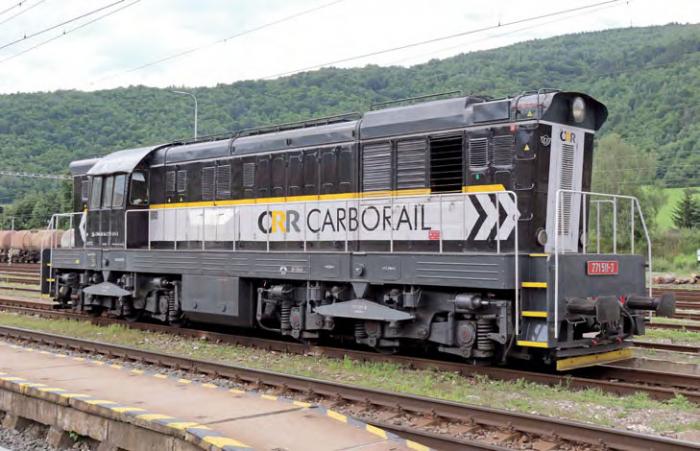
SWITZERLAND
STADLER WINS RACK EMU ORDERS
Swiss metre-gauge operator Matterhorn Gotthard Bahn (MGB) has ordered 12x3-car 11kV 16.7Hz AC EMUs from Stadler in an order worth CHF149 million (£124 million). The new trains, which can operate anywhere on the MGB network, in multiples of up to three if required, will replace loco-hauled stock operating regional trains and some of the MGB loco fleet from 2022-23. An option for 15 more units has been agreed; these are likely to be ordered in 2028.
The new MGB trains have been named ‘Orion’ by Stadler following the company’s love of platform names with multi-lingual acronyms. Orion in the original German is Optimaler Regionalzug Im Oeffentlichen Nahverkehr (which translates less well as ‘optimal regional train in public regional transport’). MGB is part of the BVZ Holding group (formed in 1999 by combining several metre-gauge operators). The group includes the metre-gauge routes from Disentis/Mustér to Zermatt, Andermatt to Göschenen and the Zermatt to Gornergrat mountain railway.
POLARIS FOR GORNERGRAT
BVZ Holding has also ordered 5x2-car Abt rack 34.6-metre EMUs from Stadler at a cost of CHF45 million (£38 million) for use on its 9.4km Gornergrat mountain railway from 2021. The units, which will replace EMUs built in the early 1960s, will operate from the line’s unusual 725V 50Hz AC two-wire traction current. The new trains will be equipped with regenerative braking, which according to Stadler will generate enough power in three descents (from 3,089m above sea level to 1,605m in Zermatt) to power two ascents of the mountain line, reducing the energy costs of operation. The Gornergrat units will be branded Polaris – perhaps reflecting the high usage by foreign tourists; this Stadler acronym is in English (POpular LAndscape Railway In Switzerland)!
